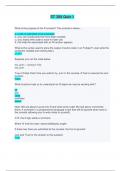Exam (elaborations)
ST 308 Quiz 1 | Questions and Answers
- Course
- Institution
ST 308 Quiz 1 | Questions and Answers What is the purpose of the R console? The console is where... a.) code is submitted to be evaluated b.) you can locate plots that have been created c.) you easily write code to save for later use d.) the help file associated with an R function appears What is...
[Show more]



